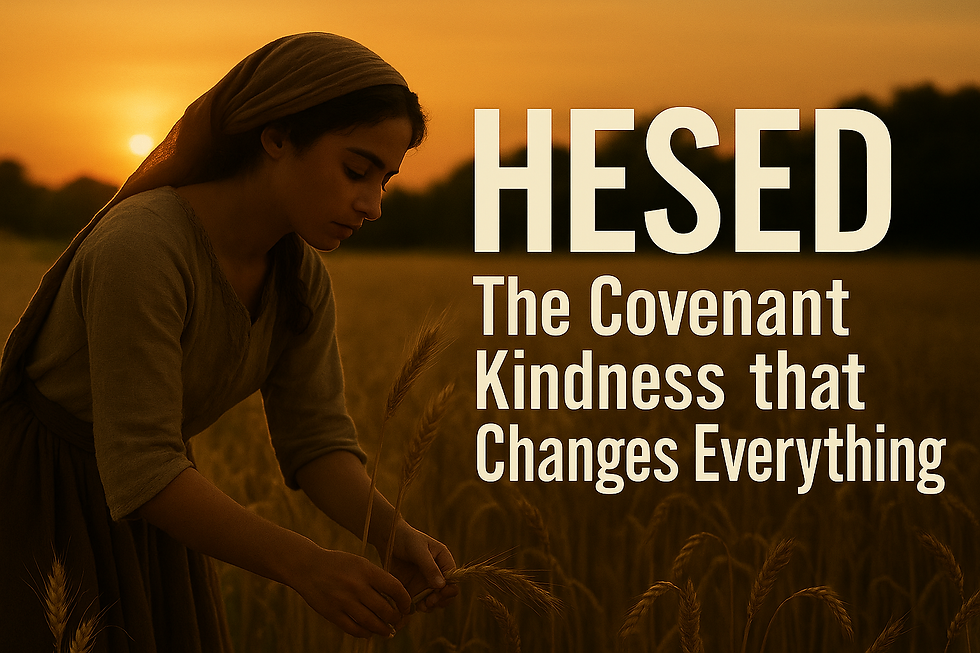From Moab to Bethlehem: Ruth and the Gospel of Inclusion
- Bible Believing Christian

- Oct 21, 2025
- 4 min read

From Moab to Bethlehem: Ruth and the Gospel of Inclusion
Ruth enters the biblical story wearing two heavy labels: Moabite and widow. By law, she should have been excluded—“No Ammonite or Moabite shall enter the assembly of the Lord” (Deuteronomy 23:3). Yet God writes her name into the very genealogy of Jesus Christ. Her story proves that God’s covenant mercy transcends ethnicity, law, and history. Grace reaches across every border and overturns every barrier when faith and faithfulness meet.
Biblical Foundation
“No Ammonite or Moabite may enter the assembly of the Lord; none of their descendants, even to the tenth generation, may ever enter the assembly of the Lord.” (Deuteronomy 23:3, NASB)
“Where you go, I will go, and where you sleep, I will sleep. Your people shall be my people, and your God, my God.” (Ruth 1:16, NASB)
“May the Lord reward your work, and may your wages be full from the Lord, the God of Israel, under whose wings you have come to seek refuge.” (Ruth 2:12, NASB)
“Salmon fathered Boaz by Rahab, Boaz fathered Obed by Ruth, and Obed fathered Jesse.” (Matthew 1:5, NASB)
From curse to covenant—from Moab to Bethlehem—Ruth’s journey is the gospel in miniature.
Word Study — gēr (גֵּר) and the Language of Belonging
Hebrew distinguishes several kinds of “outsider”:
גֵּר (gēr) – a resident foreigner who seeks protection within Israel’s covenant order.
נָכְרִי (nokhrî) – a foreigner who remains outside the covenant.
תוֹשָׁב (tôshāv) – a temporary dweller or boarder.
Ruth becomes a gēr—a sojourner whose loyalty binds her to Israel’s God. Boaz recognizes this: “You have come to seek refuge under His wings.” (Ruth 2:12). In other words, belonging in God’s kingdom is defined by covenant allegiance, not ethnicity.
LXX Insight: The Septuagint renders gēr as προσήλυτος (prosēlytos), a word later used for Gentiles who embraced Israel’s faith. Ruth’s move from Moab to Bethlehem is linguistically a move from distance to devotion—from stranger to worshiper.
“No Moabite”? Reading Deuteronomy 23 in Context
At first glance, Deuteronomy 23:3 seems absolute. But context reveals why Ruth’s inclusion is legitimate—and theological.
Masculine Grammar: The Hebrew nouns ‘Ammōnî (“Ammonite”) and Mo’ābî (“Moabite”) are masculine. Rabbinic tradition (e.g., Yevamot 76b) concluded the ban targeted the male aggressors who hired Balaam and opposed Israel, not women who later sought refuge in Israel’s God.
Ethical Purpose: The following verses (Deut 23:4–5) explain why: because the Moabites failed to show hospitality and sought Israel’s harm. The exclusion is moral, not racial. Ruth, who leaves Moab precisely to bless Israel, reverses that offense.
Covenantal Balance: Elsewhere the Torah commands love for the gēr:
“The stranger who resides with you shall be to you as the native among you, and you shall love him as yourself.” (Leviticus 19:34, NASB)
Israel’s holiness laws guard purity of worship, not purity of blood.
LXX Note: The Greek οὐ μὴ εἰσέλθῃ Ἀμμανίτης καὶ Μωαβίτης preserves the masculine form, confirming the same nuance found in Hebrew.
Historical Context — From Moab’s Shame to Ruth’s Redemption
Genesis 19: Moab’s line begins in scandal—Lot’s daughter conceives Moab after Sodom’s fall.
Numbers 22–25: Moab later hires Balaam and tempts Israel to idolatry.
Judges 3: Israel even suffers under Moabite oppression.
Against this backdrop, Ruth’s faith is explosive: she forsakes Moab’s gods, family, and future to serve Yahweh and Naomi. Where Moab once cursed Israel, a Moabite woman now becomes a conduit of blessing.
Ruth’s Inclusion — Grace Working Through Law
Conversion of Allegiance: Ruth’s vow in 1:16–17 mirrors covenant formula—“your God, my God”—making her confession of faith the centerpiece of the book.
Embodied Faithfulness: Ruth’s devotion is practical. She gleans, protects Naomi, and follows Israel’s laws of purity and harvest.
Covenant Hospitality: Boaz extends mercy grounded in Torah justice. His generosity fulfills Leviticus 19’s gleaning laws yet exceeds them through ḥesed—active covenant love.
Legal Redemption: Boaz acts as go’el (kinsman-redeemer), fulfilling both Leviticus 25’s property redemption and Deuteronomy 25’s levirate duty, transforming law into love.
Theological Reflection — Inclusion Without Dilution
Ruth’s inclusion is not a softening of holiness but its fulfillment. God does not lower the standard of covenant faithfulness; He opens the door through repentance and faith.
Ruth leaves idolatry behind; inclusion demands transformation.
Boaz maintains holiness while extending mercy; inclusion protects righteousness.
God remains just and the justifier—the same pattern Paul later expounds in Romans 3:26.
LXX Bridge to the New Testament: Ruth’s ḥesed becomes the New Testament’s ἔλεος (eleos)—divine mercy realized in Christ. Paul echoes this pattern in Ephesians 2:13: “But now in Christ Jesus you who previously were far away have been brought near by the blood of Christ.”
Connection to Christ
Matthew’s genealogy lists Ruth to proclaim that the Messiah’s story was multi-ethnic by design. Tamar (a Canaanite), Rahab (of Jericho), Ruth (of Moab), and Bathsheba (the wife of a Hittite) announce one truth: the bloodline of Christ is already the story of grace crossing borders.
Christ completes Ruth’s narrative arc:
The True Redeemer — He pays the ultimate price to bring outsiders into God’s household (Mark 10:45; Ephesians 2:19).
The Lord of the Harvest — He welcomes the weary to His field (Matthew 9:37–38; John 4).
The Prince of Peace — He destroys the dividing wall between Jew and Gentile (Ephesians 2:14).
Through Jesus, every foreigner becomes family.
Christ-Centered Conclusion
From famine to fullness, Ruth’s journey mirrors humanity’s redemption. She shows that faith is the only passport into God’s kingdom, and grace the only language spoken there. The Church must therefore preserve the tension Ruth embodies—a holiness that welcomes and a welcome that sanctifies.
“So then you are no longer strangers and foreigners, but you are fellow citizens with the saints, and are of God’s household.”— Ephesians 2:19 (NASB)
Scripture quotations taken from the New American Standard Bible® (NASB)Copyright © 1960, 1971, 1977, 1995, and 2020 by The Lockman Foundation. Used by permission. All rights reserved.


